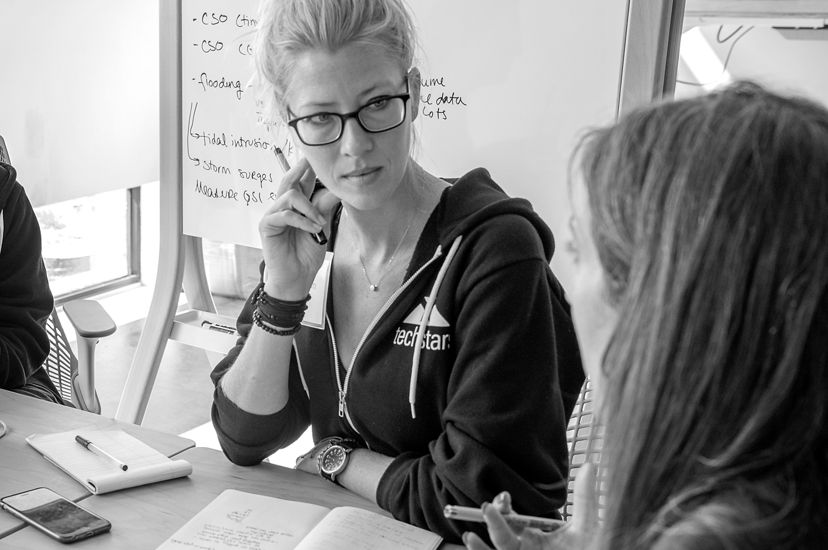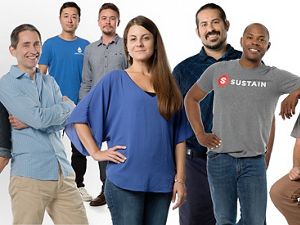Powering Green Tech
An unprecedented partnership is deploying the tools of the tech boom to help solve global conservation challenges.
Summer 2019
It’s a sunny July morning in Denver, Colorado, where a group of leaders from 10 tech startup companies has converged in a huge open office to talk business. The room, part of a complex that was once a taxicab call center, is buzzing and the row of silver coffee carafes along the wall have all been drained.
To kick things off, the T-shirt-clad teams circle up on couches and padded chairs to share their company elevator pitches with each other about who they are, why they were selected to be here and what their startup tech companies can do—especially if they can attract the attention of big investors. It’s a scene straight out of Silicon Valley, one that the tech sector has made into something of an art form by mentoring entrepreneurs and then connecting them up with investors looking to get in early on the next big thing. There’s even a name for the process: “the technology accelerator.”
But this group in Denver is playing for higher stakes than your average tech guru looking to cash in on a new phone app or digitally connected kitchen appliance. These entrepreneurs have gathered together not only to secure funding for a new business idea, but to try—each in their own way—to save the world.
Quote
These entrepreneurs have gathered together not only to secure funding for a new business idea, but to try—each in their own way—to save the world.
Erin Rothman, the CEO of a company called StormSensor, stands up to give her pitch: “Every year in the United States, 32 trillion gallons of stormwater runoff are generated by storms,” she says. “That runoff is the number one cause of pollution in urban areas. We’re talking everything from chemical pollutants to raw sewage being flushed into our surface waters. That’s insane.”
Turns out that Rothman started her career as an environmental consultant. But after a decade of listening to city officials complain about the lack of affordable tools for tracking polluted stormwater from their sewers into neighboring waterways, she decided to jump into the startup world and create her own solution.
By installing a network of low-cost sensors that transmit data about flow and temperature in city sewers, she says her company can “give cities the tools that they need to identify, track, and predict and prevent pollution in real time.”
She wraps up to a round of applause, and right away the other startup leaders pepper her with questions: How will you make money? (It’s a subscription service, where the city pays monthly for the data.) Have you tested it? (Yes, in Jersey City, New Jersey, and two other cities.) Do you have any competitors? (Yes, but their sensors cost roughly 10 times more than ours.)
Following Rothman, each CEO steps up in turn to present both a serious environmental challenge and a vision for using technology to tackle it. A team from the company Node presents a plan to roll out prefabricated, sustainable and super-efficient housing. The cofounders of ThisFish share their system that will help stop illegal and unsustainable fishing practices by digitally tracking fish from catch to plate. The CEO of Sustain presents a software package that helps companies reward good environmental habits in the workplace, such as recycling or turning off lights.
The notion of using technology to solve critical problems—all while making a profit—is not a new one. But it hasn’t often been applied to big environmental challenges.
In fact, this meeting is a first-of-its-kind mashup between the technology startup community and a conservation organization. It’s the result of a new partnership between The Nature Conservancy and the Techstars global network of entrepreneurs to host a “sustainability accelerator” focused on cultivating entrepreneurial innovation to help out nature.
With growing threats from climate change, water shortages and other environmental challenges, the time is right to engage with Techstars and the creative startup community, says August Ritter, TNC’s accelerator program director. “Tech has disrupted so many other industries; it’s time for technology to disrupt our industry.”
“We want to see things happening faster,” says Ritter. “For TNC, it’s about, how do we get
more entrepreneurs and technologists building companies that solve conservation problems that actually matter?”
Techstars was founded in 2006 in Boulder, Colorado, and has since set up tech accelerators around the world. The company has mentored some 1,600 companies and has helped them raise more than $6 billion in investments.
“We do everything really fast,” says Jenna Walker, Techstar’s managing director for the 2018 Sustainability Accelerator in Denver. It’s been a month since the company founders first gathered, and Walker has been in the trenches every day working to advance the prospects of each company.
“In the past week we have had hundreds of mentor meetings come through this building,” says Walker, calling it a feat of “not only scheduling, but brainpower.”
An accelerator typically brings together a class of 10 startup-company founders for a three-month intensive program. In exchange for granting Techstars a 6 percent stake in their company, the founders will get the chance to meet with hundreds of CEOs, investors, industry innovators and other “mentors,” who will help rapidly advance the startup’s growth and ability to attract investment seed money.
“Within the broad community of startups, there is a failure rate of about 80 to 85 percent,” says TNC’s Ritter. “That number is flipped for companies that participate in Techstars—80 to 85 percent succeed.”
At the end of the three-month accelerator, the entrepreneurs give their new-and-improved pitches in a public presentation for potential investors at an event called “Demo Day.”
The Sustainability Accelerator represents a significant shift for Techstars. “Lots of entrepreneurial energy is spent on things that don’t really have much impact on the world,” says Techstars cofounder Brad Feld. “So it felt very powerful to reflect on the idea of actually doing entrepreneurial ventures with … TNC, while also helping the next generation of companies create viable, successful businesses doing something that helps change the world.”
Quote
When we look at the threats to the natural world, we can't help but conclude that we've got to pick up the pace. We have to do more, be better, be faster.
It is also unlike anything TNC has done before. Through this partnership, TNC is trying to figure out how to “take advantage of technology breakthroughs to accelerate progress for our mission,” says TNC CEO Mark Tercek. “When we look at the threats to the natural world, we can’t help but conclude that we’ve got to pick up the pace,” he says. “We have to do more, be better, be faster.”
As a result, the Conservancy is hosting the accelerator at the Denver office, and has lined up a number of the volunteer mentors who will help the company founders, including staff scientists, policy leaders, trustees and even marketing experts. In addition, TNC has already started in on pilot projects with six of the tech companies.
And the group of companies in the Sustainability Accelerator is just the start. At least two more are planned for 2019 and 2020.
Three months after completing the accelerator in Denver, StormSensor’s Erin Rothman seems a bit shell shocked by the new pace of her life. “I just pitched a group of investors,” she says on a Friday morning at 9 a.m. in January. Having completed Techstars, though, she believes she could probably give her pitch in her sleep. “We have raised more than $1.8 million,” she says. And the company has commitments for pilots in 23 cities.
Despite her company’s recent successes, Rothman is all business. In two weeks she is headed to Pawtucket, Rhode Island, where she will descend into a sewer to install two new sensors. It’s not a part of the job she relishes, but she is totally committed. “I don’t even like going into gyms because they’re all sweaty,” she says. “So sewers are a step below that.”
The new sensors will augment three others installed in December that will track the effectiveness of a new project aimed at slowing down stormwater runoff. The project will add permeable pavement and green roofs to a part of the city that is covered with so much pavement that it is 97 percent impervious to water.
It’s a project that wouldn’t have happened without the Sustainability Accelerator.
“We’ve known for a long time that tech can make a big difference in conservation,” says former TNC President Brian McPeek. “This is an experiment in figuring out how we can better leverage technology to solve conservation problems, and an experiment that is off to a great start.”
Get the Magazine
Sign up to become a member of The Nature Conservancy and you'll receive the quarterly print edition of the magazine as part of your membership.










